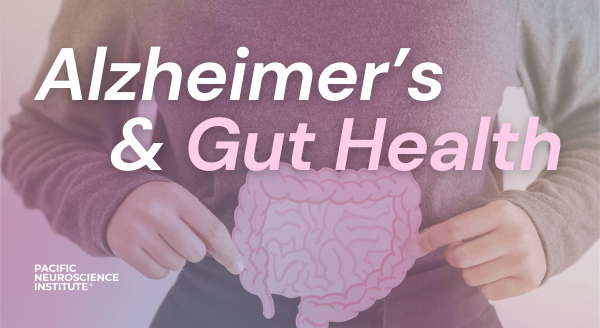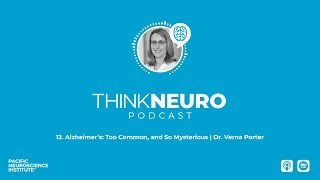

Gut Bacteria and Alzheimer’s: An Early Sign of Alzheimer’s Disease May Be Lurking in Your Gut Microbiome
by Brianna Rauchman
Your gut microbiome could be the key linked to your Alzheimer’s disease risk.
- New research links gut microbiome to Alzheimer’s disease risk.
- People with early markers of Alzheimer’s disease had similar gut microbiome compositions that were different from those without early signs of the condition.
- Experts explain the findings.
Alzheimer’s disease is a complex condition, and scientists are still trying to figure out why people develop the disease. Now, a new study suggests the bacteria in your gut may play a role in whether you develop Alzheimer’s.
The study, which was published in the journal Science Translational Medicine, looked at the gut microbiome and composition of 164 older people (ranging in age from 68 to 94) with normal cognition. The researchers checked for the presence of proteins in participants’ brains associated with Alzheimer’s disease—amyloid and tau—and had them complete cognition tests to try to identify those who may have early markers of Alzheimer’s disease.
The scientists then used fecal samples to compare the bacteria found in the guts of 49 people with markers for Alzheimer’s disease with those without markers.
The researchers found that people with preclinical Alzheimer’s disease (meaning: They don’t yet have symptoms of the condition) had different gut microbiomes than those without the disease. Specifically, people who were in the preclinical stages of Alzheimer’s often had higher levels of bacteria that are involved in breaking down the amino acids arginine and ornithine, which are involved with protein buildup (Alzheimer’s disease is thought to be caused by the build-up of proteins in and around brain cells). Those who didn’t have preclinical Alzheimer’s disease typically had more bacteria that are involved in glutamate degradation, which can protect neurons (nerve cells that act as messengers in your body).
The researchers also took that information and compared it with risk factors, including a family history of Alzheimer’s disease, the study participants’ age, genetics, and whether they had diabetes, along with their brain images to try to predict who was in the early stages of Alzheimer’s—and it was pretty accurate.
“Gut microbiome correlates of preclinical Alzheimer’s disease neuropathology may improve our understanding of Alzheimer’s disease etiology and may help to identify gut-derived markers of Alzheimer’s disease risk,” the researchers concluded.
But what does your gut have to do with your Alzheimer’s disease risk, and what can doctors do with this information? Here’s what you need to know.

What does the gut bacteria in your gut have to do with your brain health?
Your gut and brain are in two different areas of your body, but research has shown they can influence each other. There’s something known as the gut-brain axis, which is basically communication between your brain and gut that links the emotional and cognitive centers of your brain with some functions in your intestine.
Some examples of your gut-brain axis at work: Getting diarrhea or constipation when you’re stressed, or feeling butterflies in your stomach when you’re nervous.
Researchers are still exploring how the gut-brain axis may influence a host of diseases, including irritable bowel syndrome (IBS), depression, and obesity.
What’s the relationship between your gut microbiota and brain in Alzheimer’s?
It’s not entirely clear at this point. it’s hard to tell if the gut is influencing the brain or the brain is influencing the gut. Meaning, it’s unclear right now if the gut microbiome changes are due to changes in the brain or if the gut changes are actually contributing to Alzheimer’s disease.
The findings are quite promising, but there are limitations regarding the study design, as it is based on correlational data and includes individuals who have already developed the disease. However, if these findings are further verified and expanded upon, they indicate that managing or utilizing the microbiome could be beneficial in preventing the onset or progression of Alzheimer’s disease.
The connection is also being explored beyond this study.
Research suggests that chronic inflammation in the brain can raise the risk of developing Alzheimer’s disease by causing damage and death to neurons. Research has also indicated that high-fiber foods like whole grains, fruits, and vegetables, may help reduce inflammation. The National Institute on Aging (NIA) notes that certain gut bacteria convert the fiber from these foods into compounds called short-chain fatty acids (SCFAs), which can fight inflammation and have been found to improve memory in animals.
Results of one preclinical study published last year, for example, found that a high-fiber diet changed the types of bacteria in the gut microbiome, increased the production of SCFAs, and reduced the expression of some genes that control inflammation in the brain.
“We’re just seeing that there’s a close gut-brain connection in terms of physical health over the course of the aging process,” says David Merrill, MD, PhD, a geriatric psychiatrist and director of the Pacific Neuroscience Institute’s Brain Health Center in Santa Monica, CA.

What happens with the gut microbiome and Alzheimer’s now?
It’s not entirely clear. The latest study found that both healthy people and those with preclinical Alzheimer’s disease had different gut bacteria despite eating basically the same diet.
This work could lead to a future diagnostic test that would be easier to administer and more accessible to the general public.
It can also assist individuals who show early signs of Alzheimer’s disease in slowing down or potentially preventing the progression of the condition. Various therapies, such as probiotics, are available. The key question is whether we can modify the gut microbiome to decrease certain elements and increase others, which could result in alterations to amyloid or tau.
Researchers have started a five-year follow-up study to investigate if the differences in the gut microbiome play a role in causing or resulting from the observed brain changes during the initial phases of Alzheimer’s disease. The connection between our brain and gut could hold significant potential for the future of treating and preventing Alzheimer’s.
Article adapted from Prevention.
About Dr. Merrill

David A. Merrill, MD, PhD, is an adult and geriatric psychiatrist with double-board certification by the American Board of Psychiatry and Neurology. He is director of the Pacific Brain Health Center at Pacific Neuroscience Institute. Dr. Merrill has worked for several decades with patients suffering the behavioral health sequelae of age-related neurodegenerative disorders such as Alzheimer’s disease and Parkinson’s disorder.
What is the number one modifiable predictor of Alzheimer’s?
While genetic factors are the number one predictor of Alzheimer’s Disease, clinical evidence increasingly links gut health as the number one factor we can alter or change that is linked to Alzheimer’s. Researchers have discovered that the balance of gut bacteria significantly impacts brain health. Changes in the gut microbiome can lead to inflammation and the production of neurotoxic compounds, contributing to Alzheimer’s disease.
- Gut Microbiome: The diverse community of microbes in the digestive system influences immune function and brain chemistry.
- Gut Bacteria: Specific bacterial strains produce metabolites that can either protect or harm brain cells.
- Microbial Imbalance: Disruptions in the gut microbiome have been associated with increased beta-amyloid plaques, a hallmark of Alzheimer’s.
Understanding the connection between gut microbes and brain health opens new avenues for prevention and treatment. Maintaining a healthy gut microbiome through diet, probiotics, and lifestyle choices may reduce the risk of developing Alzheimer’s, highlighting the critical role of gut health in neurological disorders.
What is the number one food that fights dementia?
The number one food that fights dementia is fermented foods. Fermented foods, such as yogurt, kefir, sauerkraut, and kimchi, are rich in probiotics that support a healthy gut microbiome. These foods introduce beneficial bacteria into the gut, enhancing microbial diversity and balance.
- Gut Microbiome: A healthy gut microbiome is crucial for overall brain health and cognitive function.
- Gut Bacteria: Fermented foods boost beneficial gut bacteria, which produce metabolites that can reduce inflammation and protect brain cells.
- Microbes: The microbes in fermented foods help maintain a healthy gut barrier, preventing harmful substances from entering the bloodstream and reaching the brain.
Consuming fermented foods regularly supports the gut-brain axis, a critical communication pathway between the gut and the brain. This can lead to improved cognitive function and a reduced risk of dementia. Emphasizing fermented foods in the diet is a simple yet powerful strategy to enhance gut health and combat dementia.
What is the number one food for your brain?
The number one food for your brain is fatty fish. Fatty fish such as salmon, trout, and sardines are incredibly rich in omega-3 fatty acids, which are essential for brain health.
- Omega-3 Fatty Acids: These healthy fats are crucial for building brain and nerve cells, essential for learning and memory.
- DHA and EPA: Two types of omega-3s, DHA and EPA, found in fatty fish, have been linked to lower levels of beta-amyloid, a protein associated with Alzheimer’s disease.
- Anti-inflammatory Properties: Omega-3s help reduce inflammation in the brain, which can protect against cognitive decline and improve mental function.
Regular consumption of fatty fish supports cognitive function, enhances memory, and may reduce the risk of neurodegenerative diseases. Including fatty fish in your diet is a delicious and effective way to promote brain health and overall well-being.
Related Links
Related Articles
Related Videos
 Alzheimer’s LA Caregiver Tips
Alzheimer’s LA Caregiver Tips
 Beating the Odds on Alzheimer’s Disease | Molly Rapozo, MS, RDN, CD and Judy Davidson
Beating the Odds on Alzheimer’s Disease | Molly Rapozo, MS, RDN, CD and Judy Davidson
 Think Neuro Podcast: Alzheimer’s: Too Common and So Mysterious | Dr. Verna Porter
One in ten Americans who are 65 and older suffer from Alzheimer’s dementia. It’s the 6th leading cause of death in the country, and it is a scourge worldwide. But…
Think Neuro Podcast: Alzheimer’s: Too Common and So Mysterious | Dr. Verna Porter
One in ten Americans who are 65 and older suffer from Alzheimer’s dementia. It’s the 6th leading cause of death in the country, and it is a scourge worldwide. But…
 Susan’s Story | Alzheimer’s Disease
Susan shares her moving story of the devastating effect of Alzheimer’s disease on her mother and her fear as it began taking her own memory as well. She was determined…
Susan’s Story | Alzheimer’s Disease
Susan shares her moving story of the devastating effect of Alzheimer’s disease on her mother and her fear as it began taking her own memory as well. She was determined…

Alzheimer’s LA Caregiver Tips

Beating the Odds on Alzheimer’s Disease | Molly Rapozo, MS, RDN, CD and Judy Davidson

Alzheimer’s: Too Common and So Mysterious | Dr. Verna Porter

Susan’s Story | Alzheimer’s Disease
About the Author
Brianna Rauchman
Brianna Rauchman, BA, is the Communications Coordinator for the Lifestyle Program, where she helps develop outreach strategies to connect with an expanding audience. Her responsibilities include providing launch support, developing content, assisting with collateral design, and planning social media strategies.
Last updated: August 22nd, 2024



